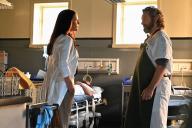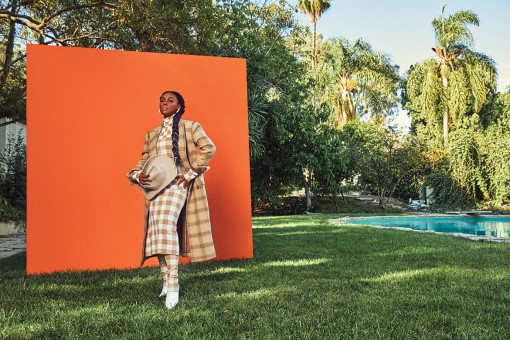Catherine Zeta-Jones lounges on an ecru sofa in a sitting room of her Irvington, New York, home.
She's wearing a plague-year appropriate housedress with a geometric print and plunging neckline. Her raven hair hangs in soft waves over her shoulders. And since she has just finished a TV appearance — via Zoom, natch, just like this interview — her makeup is done.
"That's why I'm looking so hot," she purrs in her Welsh lilt.
The late-afternoon sun streams through a curtained window directly behind her. Over her right shoulder is an abstract midcentury oil painting in earthy hues of orange, yellow and blue, a piece she picked up at an online auction from Europe. Twitter's Room Rater account might describe the setup thusly: "Art. Sofa. Drapes. Colors. Love it."
"It's nice to be out of the city," she allows. "I mean, I love the city. But I don't have the urge to go shopping," she says, drawing out the word shoooppping . "And there's more space for all of us here."
The "us" being husband Michael Douglas, children Dylan, 20, and Carys, 18, and her maltipoo, Taylor. "It's easier with my dog to go for a walk here," she continues. "It's nice. It's a crazy time."
Zeta-Jones is explaining how Covid affected production on the second season of the Fox drama Prodigal Son, on which she has a seven-episode arc as Dr. Vivian Capshaw, the mysterious doctor in charge of the infirmary at the show's psychiatric hospital for the criminally insane.
As if right on cue, a ball of caramel-colored fur streaks into the room and runs across the back of the sofa. This would be Taylor, Zeta-Jones's "very clingy" and not "socially integrated" pandemic pet. (Michael Douglas signals disinterest by stressing that Taylor is very much "Catherine's dog.")
Before the Covid lockdown, the couple were "early empty nesters," with Dylan at Brown University and Carys at boarding school in Switzerland. And so she adopted Taylor in January 2020. And then, a few weeks later, her father- in-law, Kirk Douglas, passed away at age 103. And then the pandemic hit, and the dog became a salve for not only grief but also isolation.
"We miss my father-in-law a lot," Zeta-Jones says, explaining that because of the pandemic, they could not plan a proper memorial for the legendary actor. Then her face brightens, and she begins to laugh: "But, boy, did he dodge one. He's like, 'Okay, I'm outta here! Good luck, everybody!'"
Catherine Zeta-Jones makes her own luck. After a career spanning stage (London's West End, Broadway), screen (The Mask of Zorro, Entrapment, Chicago ) and TV (including a memorable turn as Olivia de Havilland in Ryan Murphy's Feud), she found herself, mid-pandemic, looking for a television show.
She had seen Prodigal Son and liked the series' "surrealist" undertones, and she knew that the show's star, Michael Sheen, is also Welsh.
When Prodigal Son creator–writer–executive producers Chris Fedak and Sam Sklaver began to think about casting a foil for Sheen's character, the brilliant surgeon–serial killer Martin Whitly, they knew they needed a formidable actor. Someone who, like Sheen, could deliver humor in dastardliness without resorting to camp, who could convey mystery and psychological insight without being performative.
"I was having a conversation with Michael Sheen where I was pitching season two to him," Sklaver says. "And he was like, 'Well, who are you thinking for Capshaw?' And I really, really had to be careful because I didn't want to say names that we weren't going to get. But I also didn't want to say names that wouldn't get him excited for the role.
"And so I said, 'Well, we're hoping it's Catherine Zeta-Jones, but we haven't gone out to her yet.' And the way his eyes lit up, I thought to myself, 'I am either going to make this man so happy, or he's going to quit the show.'"
They needn't have worried. "Michael and I literally come from the same village," Zeta-Jones says. "I mean, when you think of Wales and you think of where I lived and where he lived, it's like walking distance. It's incredible that we've never worked together. Not even when we were kids. So, of course that was a big draw for me. I get to work with my homeboy. And he is an incredible actor."
Wales, of course, has produced a slew of acclaimed actors, including Richard Burton and Anthony Hopkins; the latter, incidentally, was in Zeta-Jones and Douglas's 2000 wedding. Sheen and Zeta-Jones both benefited from the country's rich tradition of supporting the arts through well-regarded educational institutions.
As young performers, they were on parallel tracks — he in the youth theater academy and she in the youth dance academy. "There's a sort of energy and maybe a slightly darker edge to the people that come from there," Sheen says. "And I think Catherine and I share a lot of that.
"We both have very supportive families and that makes a massive difference," he continues. "I remember when I got to drama school in London eventually, I was shocked by how many people didn't have the kind of support from their family and their community that we did."
As the new doctor running the infirmary at Claremont Psychiatric, where Whitly is incarcerated, Capshaw tasks him with scrubbing bedpans and warns him not to "annoy me or kill anyone." Eventually the doctors develop a grudging respect for each other.
Zeta-Jones was very clear that she did not want Capshaw to sink into caricature. "She said to us, 'I just don't want to be Nurse Ratched,'" Sklaver recalls, referring to the battle-axe nurse Louise Fletcher played in Milos Forman's One Flew Over the Cuckoo's Nest (Michael Douglas produced the film; he was also an executive producer of Ratched, Ryan Murphy's adaptation for Netlix).
"The subject matter is very dark, and then there's this surrealist, larger-than-life quality to it, which as an actor to very attractive," Zeta-Jones says. "My character is a doctor, but my river runs deep. So I get to play with the layers of her."
Sheen also sees the layers. "Catherine brought a real kind of energy of a woman who has gone through a lot," he says. "On the page, the character was written in a slightly more transparent way. But she brought a smoky edge, which I thought was really interesting. And for my character, it's intriguing because it's very difficult to read her.
"He's usually very good at being able to read people, to find their weak points and manipulate them. She made this character very difficult to read, which I thought was an interesting choice."
Zeta-Jones's bona fides — the Oscar for Chicago and a Tony in 2010 for A Little Night Music — combined with her Hollywood marriage and limitless glamour, can be intimidating. But she has a ribald sense of humor and unpretentiousness that belie her A-list status.
Her Instagram feed is as likely to feature items from her Casa Zeta-Jones collection (ready-to-wear, shoes, makeup and coffee) as it is to show homey selfies with her husband. Last December, she posted a video of her foot with a large Ziploc bag of ice; she injured it putting up Christmas decorations. And she is a collaborative and generous colleague, say those who work with her.
"Her first day on set wasn't an easy walk-and-talk," Sklaver says. "She had to drill a burr hole into the back of someone's head to relieve an aneurysm. It was a very complicated scene. And we're shooting on a television schedule, which is often compressed. So we had everyone in there, Covid-compliant of course. It's a lot to figure out, and we started to get just a little bit overwhelmed with the amount of detail.
"It was almost like Catherine noticed our apprehensiveness and she said, 'Hey, you know what, guys? I say we just roll on it. I think I can figure it out.' And that really set the tone. She was mindful of making us feel comfortable. We brought in someone who has an Oscar, and she was just coming to play.
"She really wanted to be in the character, be in this world, work with Michael and have fun. Not only do we get a movie star, but we're going to get a really good hang."
She is also a tireless and joyful performer, says Queen Latifah, who first met Zeta-Jones on Chicago, which won six Oscars, including Best Picture and Best Supporting Actress for Zeta-Jones. "Everybody was working so hard, and the hardest-working person in that film was Catherine.
"We all checked our egos at the door, and we all have egos. It was like having an all-star team. But she's so down-to-earth at the same time. So when you get to see that part of her, that's what endears you to Catherine. It's not how gorgeous she is or how talented or any amount of money she might have or recognition — it's really how humble she still is and how cool she still is.
"And normal, despite all of it. She's very human, and you get to be just as human. We're not always afforded that luxury in our business, unfortunately."
Catherine Zeta-Jones is a creature of theater. She is, in the parlance, a "song-and-dance girl." Her breakout role came in the West End production of 42nd Street, when she was 19. She was the second understudy to the lead actress. But when both the lead and the understudy were unavailable, she got her chance — and went on to spend two years in the role.
A few years later, she landed a part on a period drama, The Darling Buds of May. It became the biggest hit on British TV, and Zeta-Jones was catapulted to stardom (and the pages of the rapacious London tabloids).
A string of mostly unmemorable British film roles followed, in which Zeta- Jones seemed to be cast solely for her sex appeal. The lack of meaningful parts sent her to Hollywood, where she very purposefully set out to become a movie star.
It did not take long. Steven Spielberg, having seen her in the 1996 CBS miniseries Titanic, recommended her to director Martin Campbell for The Mask of Zorro, which Spielberg was producing. Her fiery chemistry with Antonio Banderas — and the swordfight scene in which he undresses her with each swipe of his épée — catapulted her to the top of Hollywood casting lists.
Then came the heist thriller Entrapment, opposite Sean Connery (nearly 40 years her senior), in which she famously slithers under a web of lasers. These roles, though clearly objectifying, also highlighted Zeta- Jones's sly humor and obvious intelligence.
Asked if a scene like the Zorro swordfight could even be included in a big-budget action film in the post–MeToo era, she exclaims: "I hope so! I do hope so." Then she adds: "Look, with MeToo, it took a long time coming. People knew for years this was going on. And it's been a real barrage of people opening their eyes and listening.
"[But] the pendulum is going to swing back and it's going to be, 'Oh, what year was that when women went bananas?' We need to make sure the Pandora's Box stays well and truly open. Does it [affect] whether my clothes should be ripped off in Zorro or not? I hope that we don't come to that. Absolutely not."
It was her work in Zorro that caught the eye of her future husband, who asked his assistant to arrange a drink with her while they were both at the 1998 Deauville Film Festival. Last November, they celebrated their 21st wedding anniversary.
"Mutual respect" is the key to their longevity, Douglas says, adding, "I think we have to always be careful about making efforts for strangers and taking for granted the person closest to us. Actors, we care about our images, so we make all these efforts for these people we hardly know. That person who is the closest to you, don't take them for granted."
This has not always been easy. Work inevitably takes actors away from their families, often to far-flung locales.
When their children were small, the couple did their best to stagger projects so that one parent was always home. Series TV can afford a more livable schedule. (Prodigal Son shoots at Silvercup Studios in New York, about a 45-minute drive from the couple's Irvington home.) They also maintain a large compound in Bermuda, where they can retreat for privacy.
Bermuda "has zero paparazzi," Zeta-Jones says. "People there still think that Michael is Kirk Douglas. It will be like, 'Hey, watched you in Spartacus.'"
For successful actors, giving up anonymity and privacy is an irrevocable part of the job. In 2011, Zeta-Jones went public with her struggle with bipolar disorder and spent several days in a mental-health facility in Connecticut. It was a particularly difficult time for the family. Douglas had been battling cancer, and paparazzi were staking out the family's Upper West Side co-op.
"You don't get blasé about it, but you do get used to that," she says. "I was on Broadway, and Michael was shooting the second Wall Street, and then he found out he was sick. We were living in the apartment in New York, and my kids were going to school. It was really hard to get them to go outside.
"They remember that scary time when it was like click-click, [camera] flashes on the sidewalk when they went out in the morning. We were going through a family trauma. It was a chunk of time that was very difficult, not just because of our profession, but because of what life threw at us."
Yet Zeta-Jones would not trade one moment of it. "There are things that one has to sacrifice in many jobs. I get very well compensated for something that I would really do for free. So yeah, I'll get pissed off here and there, it's fine," she says, as she pushes a lock of hair behind her ear.
"I love what I do. I dreamed of walking down red carpets, I dreamed of being on the stage, I dreamed of being in a movie, I dreamed of being on TV. And all these dreams have come true."
At press time, Fox surprised the Prodigal Son production team and the show's fans with the news that it would not renew the series for a third season. Fans hoping to see the show picked up by a streaming service announced a campaign, #SaveProdigalSon. The show remains available for catch-up viewing on Hulu, FOX Now and HBO Max.
This article originally appeared in emmy magazine, Issue #6, 2021












